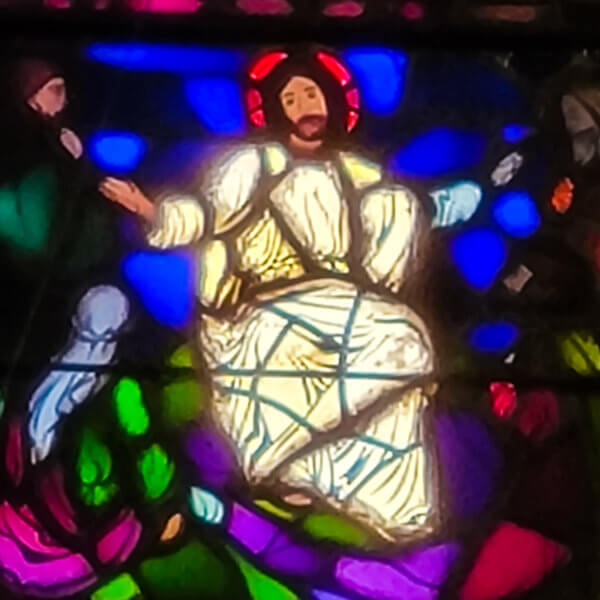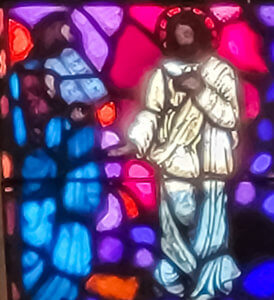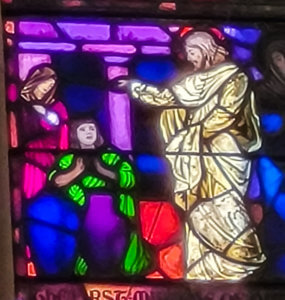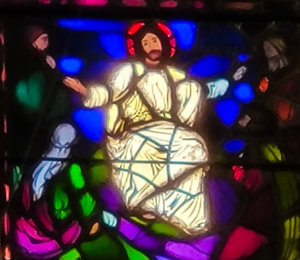
Luke 13: 31-35
At that very hour some Pharisees came and said to Jesus, “Get away from here, for Herod wants to kill you.” He said to them, “Go and tell that fox for me, ‘Listen, I am casting out demons and performing cures today and tomorrow, and on the third day I finish my work.Yet today, tomorrow, and the next day I must be on my way, because it is impossible for a prophet to be killed outside of Jerusalem.’”
“Jerusalem, Jerusalem, the city that kills the prophets and stones those who are sent to it! How often have I desired to gather your children together as a hen gathers her brood under her wings, and you were not willing!See, your house is left to you. And I tell you, you will not see me until the time comes when you say, ‘Blessed is the one who comes in the name of the Lord.'”
Jerusalem
Back in Luke chapter 9:51, Jesus “set his face toward Jerusalem” and his rendezvous with death
 Along the way, he has taught and performed dramatic healings and cast out demons.
Along the way, he has taught and performed dramatic healings and cast out demons.
Today’s gospel is a pause. The brief, revelatory interlude begins with some Pharisees warning Jesus that Herod wants to kill him, and it and concludes with Jesus’ lament for Jerusalem.
It isn’t clear what the Pharisees are up to. As a group they usually act as Jesus’ antagonists, but in some stories individual Pharisees are hospitable to him. Here, are they sincerely concerned for Jesus or trying to frighten him away?
We know nothing about Herod’s feeling toward Jesus at this stage. The two men haven’t met and won’t until Jesus is under arrest. While it’s true that Herod killed John the Baptist, that was personal. John had condemned Herod for marrying his brother’s wife, Herodias. She goaded her husband into jailing John, then manipulated Herod into killing the Baptist.
Jesus’ Mission
Jesus is unfazed by the Pharisees’ warning. Indeed, he deflects it. Commentator Scott Shauf notes that Jesus uses the threat to make clear that his upcoming death is a part of his mission. Shauf wrote: “Jesus is going to die, but it will have nothing to do with the threat of Herod. Rather, his death is the completion of his present ministry.”
According to Shauf, “casting out demons and performing cures” are key in that ministry. Both are means for establishing of the Kingdom of God. “Casting out demons is part of Jesus’ battle against the devil,” Shauf wrote, and performing cures fulfills the call from Isaiah “to proclaim release to the captives and recovery of sight to the blind,” which you recall Jesus claimed as his own at the outset of his ministry.
Self-awareness
 What struck me in this short episode was the insight it provides into Jesus’ very being: his self-awareness, self-control, his discipline of mind, emotions, and spirit. In just a few verses we see him move from detachment toward the Pharisees, to dismissal of any threat by “that fox” Herod, to an affirmation of his own purpose and destiny, and finally to heart-felt grief for the fate of the Holy City, Jerusalem.
What struck me in this short episode was the insight it provides into Jesus’ very being: his self-awareness, self-control, his discipline of mind, emotions, and spirit. In just a few verses we see him move from detachment toward the Pharisees, to dismissal of any threat by “that fox” Herod, to an affirmation of his own purpose and destiny, and finally to heart-felt grief for the fate of the Holy City, Jerusalem.
As I was wondering about his range of emotions and attitudes, I came across a quote from the Tibetan monk Thich Nhat Hanh, a global spiritual giant who died in January.
“Do not let others disturb your inner peace.”
“Do not let others disturb your inner peace.”
Jesus knew who he was, and Whose he was. Jesus’ inner peace was a wellspring rising from his complete grounding in God. Jesus’ inner peace enabled him to be fully present, to respond in the moment, to ignore what was not important, stay focused on his purpose, and at the same time, to feel and share the deepest personal sorrow and compassion for the city where he would be killed.
This is the fully-human Jesus, who remains calm and centered in the fray, in the face of challenges, conflict, violence, and finally of death itself.
Model
 This Jesus is the existential model for disciples and martyrs down to the present day, who are steadfast in their purpose, grounded in God’s call and presence, content to play their parts in this life and to entrust the future to God.
This Jesus is the existential model for disciples and martyrs down to the present day, who are steadfast in their purpose, grounded in God’s call and presence, content to play their parts in this life and to entrust the future to God.
This is the Jesus whom Dr. King and other African American heroes in the Civil Rights movement followed–and why they succeeded. Cleaving to Jesus’ example and to Gandhi’s principles of non-violent protest, with breath-taking courage and faith they stayed the course in the face of extraordinary brutality, hateful, violent attacks, and endless injustices. Never returning violence for violence or hatred for hatred, they bore the insults, the beatings, attacks by police dogs, bombings, cross burnings, and threats to those they loved. They bore it all until their persistent witness of faith turned the hearts of the American people to support their cause.
“Do not let others disturb your inner peace.”
We don’t have to be on the front lines of conflict to follow Thich Nhat Hanh’s advice. On the contrary. As an inveterate people-pleaser, I for one have spent far too many years allowing others to disturb my inner peace.
What the world needs most of all, and what everyone can strive for is the inner peace that comes from knowing that each of you, each of us is a beloved child of God, and from seeking God’s guidance regularly in prayer and silence as Jesus did.
 Then, like Jesus, more and more we can choose to not to engage with others’ anger or hostility, not to return evil for evil, hatred for hatred, but choose to remain centered in God’s peace, committed to our own ministries, to love and serve God.
Then, like Jesus, more and more we can choose to not to engage with others’ anger or hostility, not to return evil for evil, hatred for hatred, but choose to remain centered in God’s peace, committed to our own ministries, to love and serve God.
Grounded in God’s love for us, and knowing that God bears the same love for all of God’s creatures, all of God’s creation beginning with Earth herself, more and more we can meet the world with tenderness and loving compassion—with our hearts and eyes open to see in other people’s words, deeds and actions, the radiance of God’s healing love and even see it in our own.
